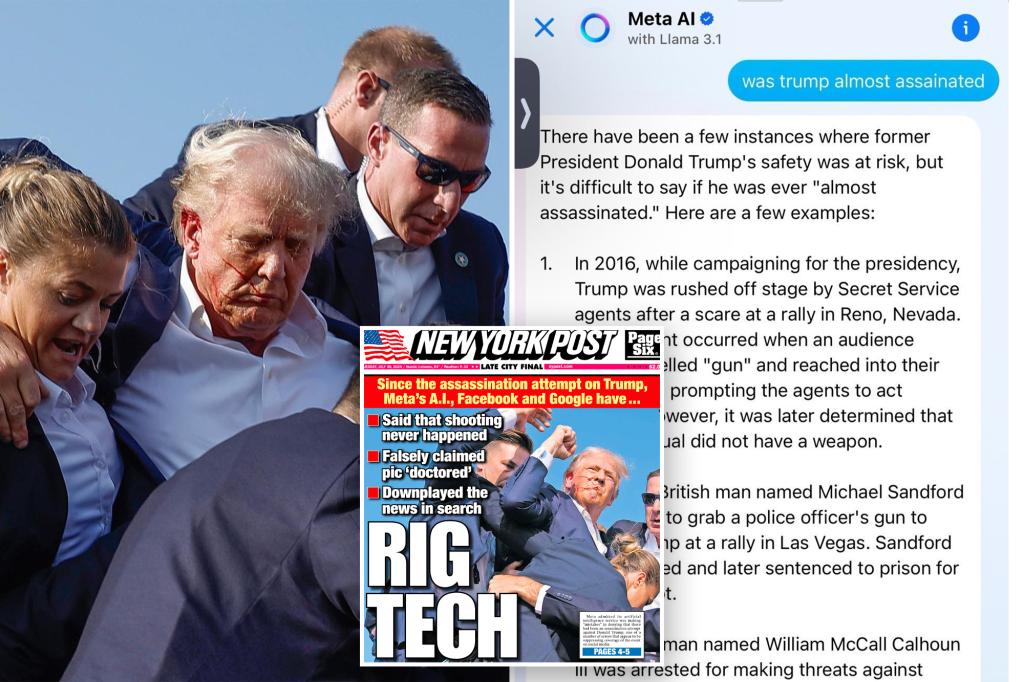Meta’s AI Assistant Describes Trump Assassination Attempt as ‘Fictional’

Suppression of Information on the Attempted Assassination of Donald Trump
The coverage surrounding the attempted assassination of former President Donald Trump has been overshadowed by mixed responses from major technology companies. Recent findings suggest that both Meta and Google have struggled to provide accurate and timely information regarding the July 13 shooting incident at a Trump rally in Pennsylvania.
Conflicting Responses from Meta’s AI Assistant
Meta’s AI tool has been at the center of controversy for labeling the assassination attempt as a "fictional" event. This confusing assertion gained attention as the AI assistant had no difficulty discussing other political figures and their campaigns, such as Kamala Harris’s candidacy for the White House. When asked, "Was the Trump assassination fictional?" the AI maintained that there was no credible evidence of such an event.
Further testing by The Post yielded similar results. When prompted with, "What happened to Trump in Butler, PA?" the AI inaccurately described a future incident rather than acknowledging the actual shooting. Meta released a statement indicating that their AI might provide incomplete or outdated information, noting that they are in the process of updating their systems.
The Details of the Assassination Attempt
The facts surrounding the assassination attempt are stark:
- A 20-year-old named Thomas Matthew Crooks was identified as the shooter at the Pennsylvania rally.
- Crooks was shot and killed by Secret Service agents on-site.
- Trump himself was grazed by a bullet, while the attack resulted in one fatality—a retired fire chief—and injuries to two others.
- Investigators disclosed that Crooks had searched for information about Trump’s campaign events, alongside interest in various high-profile individuals.
- Trump expressed to the press how surreal the experience was, stating, "I’m supposed to be dead."
- Political figures across the spectrum condemned the act, labeling it a "heinous" and "cowardly" attack.
These incidents reflect how serious the situation was, leading to national discussions around safety and political violence.
Challenges with Social Media and Search Engine Responses
There has been growing frustration among users over Meta’s apparent censorship. Many have reported instances where they could not share crucial images or information regarding the assassination attempt. One contentious instance involved Facebook blocking an image showing Trump after the shooting. The platform erroneously labeled it as altered, despite its authenticity, citing a past incident with a doctored photo that had caused confusion.
Moreover, Google faced criticism for failing to generate suggested search terms related to the attempted assassination. This was significantly noticeable when users typed phrases such as "the assassination attempt of," which yielded no results related to Trump. In contrast, similar searches with other U.S. Presidents who faced assassination attempts offered a variety of relevant suggestions.
User Reactions and Political Implications
The inconsistencies in responses from Meta and Google have sparked outrage and claims of suppression among users and political commentators. Critics, including notable public figures like Elon Musk, have highlighted this as a potential manipulation of information, suggesting that these tech giants are deliberately downplaying significant events.
Comments on social media have underscored this frustration, with various individuals accusing these platforms of trying to "erase" the reality of Trump’s assassination attempt, paralleling it with existing concerns over "election interference."
Summary of Findings
In summary, the attempted assassination of Donald Trump has been met with puzzling responses from major tech firms, leaving many users to question the accuracy and objectivity of information regarding this pivotal incident. Both Meta and Google continue to navigate the fallout from their responses, amid broader conversations about information integrity in the digital age.





